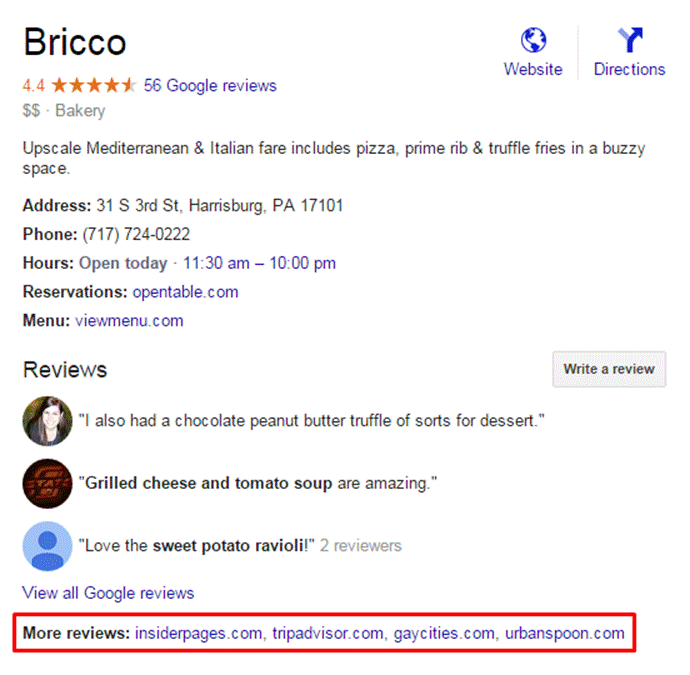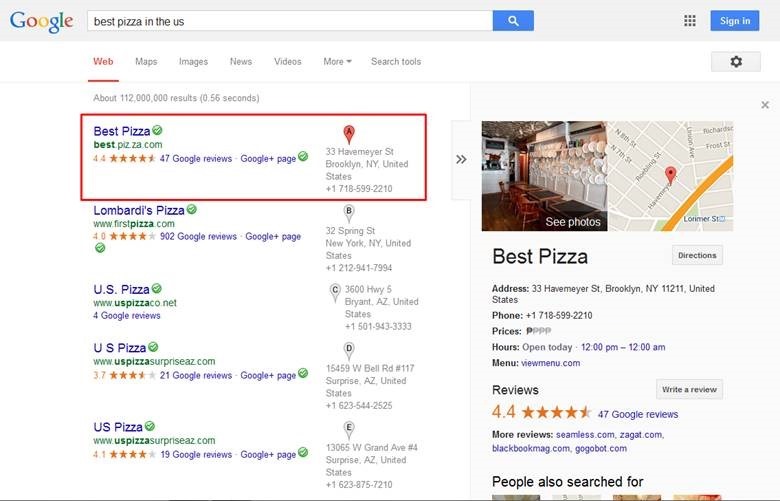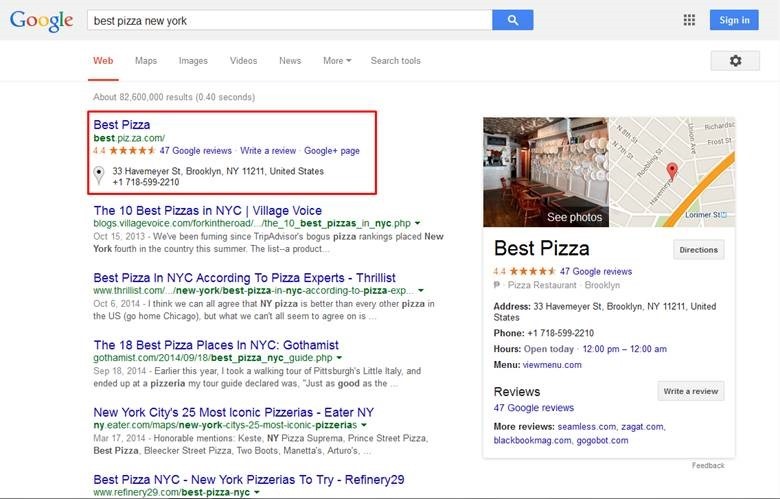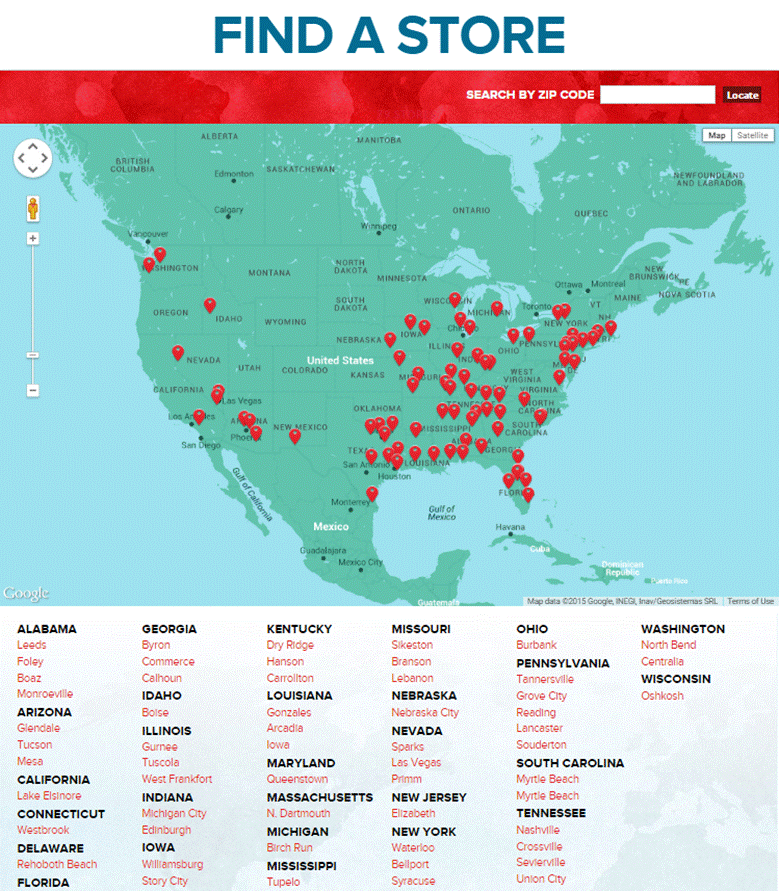After the release of Google's Pigeon update in mid-2014, local search became more important than ever. Some businesses - such as those from the jobs, real estate, film and insurance industries - tumbled from their original search rankings. Others were more fortunate, as they had the foresight to implement certain strategies to keep them at the top of the SEO game. Let's take a closer look at five of those fortunate businesses, and how they managed to be that way.
Bricco's Barnacle SEO
"Barnacle SEO" is a tactic where a business attaches its name to top-ranked sites, the way barnacles attach themselves to whales' skins. One company that has benefited from this is the Italian-Mediterranean restaurant Bricco, as shown below.
As you can see, Bricco isn't just one of the top results for best Harrisburg restaurants; it's the top result. Comparing its ratings and reviews with those of other Harrisburg restaurants, it's easy to credit Bricco's success to those two numbers alone. However, there's more to it than that.
Take a closer look at Bricco's Reviews section in the preview:
Notice that Bricco has reviews from sites like TripAdvisor and Urbanspoon. Customers consider these sites trustworthy sources of information, so these tend to rank high on Google. Basically, if your business has good ratings and reviews, and is listed on one of the major reviews sites, it has a good chance of not getting drowned out by competitors SEO-wise.
Takeaway: Practice good "Barnacle SEO" by making sure your business has a presence on other review sites that are trusted in your industry, such as Yelp for restaurants and service businesses, or HealthGrades for healthcare providers. To build up this presence, remind your customers to review you on these venues by placing Yelp signs on your business or linking to your reviews from your email signature.
AMC: Awesome By Association
Earlier, I mentioned that movie theaters were one of the hardest-hit by the Pigeon update. AMC seems to be an exception, though.
In fact, for the keywords "best movie theatre new york," Google pulls out two top-ranked results for AMC. What's interesting here is that Google placed AMC Loews Lincoln Square 13 on top of search results, even though its closest competitor has a higher rating.
Does this mean ratings shouldn't matter at all? No. On the contrary, 90 percent of customers rely on online reviews to help them with their buying decisions. Based on AMC's case, it's not a good idea to focus on ratings and reviews alone as a measure of SEO success.
Speaking of which, there's another interesting component to AMC New York's success on Google:
Notice how AMC in the meta tags is highlighted in bold? That means Google somehow associated the three-letter acronym with the "best movie theatre new york" search string. Seems like AMC did its SEO homework.
Takeaway: While it's not going to be easy for you to influence Google into associating your brand name with a more commonly-searched keyword, the key to faring well in semantic search is performing great keyword research. Make sure to discover all the most common keyword variations and to incorporate them throughout the relevant pages of your site.
Mr. Rooter: Monopolizing Local Keywords
If Greater Syracuse residents search for plumbers in their area, using every Greater Syracuse + plumbing-related keyword combination they can think of, they'll see this:
How did this happen? Well, aside from doing what Bricco did - i.e. get listed in all the right places - Mr. Rooter's website has a ton of useful, optimized, plumbing-related content. They went above and beyond the content offered to them by corporate by building out their own content strategy.
Takeaway: If you run a franchise, don't be tempted by the free standard content provided by corporate - using it will likely leave you with a website full of duplicate content. Instead, conduct a search and destroy campaign to find everything identical, and hire a copywriter to create unique and engaging copy that will better serve potential customers. The same applies if you have product descriptions provided by your suppliers; your SEO will fare better if you write unique descriptions instead.
Best Pizza: Cheekiness Pays Off
Normally, Google penalizes businesses that overstuff their name with keywords. For example, if you want to rank for the keywords "used cars indianapolis," writing "best cheap quality used cars Indianapolis" in your title tag is a surefire way to disappear from search results.
However, Google doesn't seem to have a problem with New York's Best Pizza. Yes, that's the business name. On the contrary, adopting this rather bold name has done wonders for the business, SEO-wise.
Yes, exact match is still alive and well. Best Pizza effectively barred competitors from integrating their money keyword as comfortably in their title tags. After all, no pizza chain would want to be mistaken for its competitors.
Also, judging from the result of the "best pizza new york" search, this strategy works on a local level too:
The fact that Best Pizza actually lives up to its name - as evidenced by the 4.4 rating and the 47 reviews - helps a lot, too. What's not to like about this company's local SEO strategy?
Takeaway: Exact match domains still work - within reason. CTLDs and other new TLDs make it possible to be really creative with your EMD. Distance yourself from the spammers using this technique by backing up your keyword-rich domain name with a good social presence and online reviews, which will legitimize your business and make Google less likely to penalize you.
VF Outlet: Locations, Locations, Locations
VF Outlet, one of the earliest pioneers of retail outlet centers, is literally all over the country. To help customers find their way to one of their many locations, the store has a map locator feature on its website, as well as contact information clearly spelled out underneath the map:
By itself, the map can't be crawled by Google. However, instead of just shutting off their store locator to crawlers, they also list out all their locations by city and state - a good decision for their visitors AND Google. That way, Google has access to all that valuable location info, and users have three different ways to find the information they are looking for (zip code search, zooming into the map, or finding their city on the list).
Takeaway: Make your store locator human- AND bot-friendly by giving visitors multiple ways to find the location they need and including a simple, crawlable list. WWMCD? Create an optimized page for each location.
Optimizing Your Own Google My Business Page
Aside from the strategies successfully implemented by the abovementioned businesses, here are other things you can do to optimize your Google My Business page and boost your local search rankings:
- At a minimum, be sure to provide your NAP - name, address, and phone.
- Upload quality photos that best represent what your business is all about. Use original and professional-looking images, rather than stock photography. Make sure that the photos you choose look great even at small sizes, so that if they come up in the local listing box they appeal to potential customers.
- File your business under the right category. The more specific - e.g. "Japanese Manga Store" instead of "Comics Store" - the better.
- Encourage customers to leave reviews on your Google My Business page and Yelp. If you receive a negative review, respond to it with a sincere apology, and a specific action plan to address the reviewer's concern. Don't respond with anger, unless you're looking for a PR nightmare.
- Have an active social media presence. Set up accounts on Facebook and Twitter, consider trying Instagram, and be sure to claim your Yelp listing.Like the other updates before it, Pigeon shook online marketing to its core. There's no telling when the algorithm will strike again, so keep your eyes peeled for updates. Also, it's best to concentrate on serving your local customers better - in the same way Google concentrates on improving the search experience for its millions of users.








